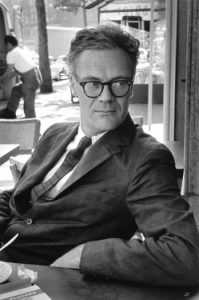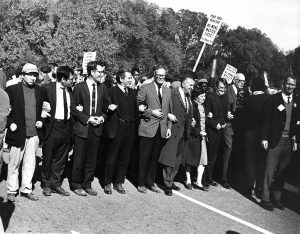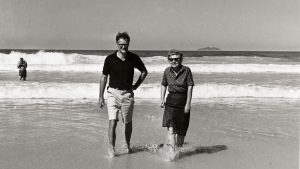by Robert Fay

I get sad whenever I think of Robert Lowell. He is the poet of a lost America, an America that likely never was, but one that is gone nonetheless. I get sad when I think of Robert Lowell because of my own inadequacy to love poetry the way he did, the way I once did, when I was more vulnerable, when I was more courageous. I get sad for Robert Lowell because he is unfashionable and his legacy may soon disappear, if not from our university curriculums, than certainly from our hearts.
The optics, as they now say, don’t look good.
Lowell was the patrician poet with a trust fund; the privileged, white-male literary figure who wore a corduroy sport jacket and sloppily-knotted tie—the casual wear of the “bummy rich,” as they were once known on Boston’s North Shore. He was the old Brahmin from Yankee Beacon Hill, whose full name was Robert Traill Spence Lowell IV, and whose ancestors were a “who’s who,” of American history, including William Samuel Johnson, a signer of the U.S. Constitution, and Jonathan Edwards, the Calvinist theologian whose sermon “Sinners in the Hands of an Angry God,” is a foundational American literary text.
And then there was his relationships with women.
He seduced, married, acquired and discarded female lovers at a rate that is indefensible today. He slept with students decades younger than himself, and during periods of mania, he was verbally cruel to friends, lovers and family. Lowell was indeed promiscuous and unfaithful, but he was not a proto #MeToo perpetrator. Kay Redfield Jamison in her recent psychological biography Robert Lowell: Setting the River on Fire (2017), examined Lowell’s medical records and writes of how Lowell courageously created great art and maintained friendships despite repeated breakdowns and psychiatric hospitalizations.
Jamison writes, “(Lowell) had many affairs, most of them in the early stages of his manic attacks…most of these affairs were with writers, a few of them with students, and generally they were characterized by respect and affection.” Lowell was also a loyal and platonic confidant to Jackie Kennedy and he had a lifelong friendship with the lesbian poet Elizabeth Bishop and their lovely correspondence is collected in the volume Words in Air (2010).
I get sad when I think of Robert Lowell because America is in turmoil once again and there are no cultural figures of his stature to push back. And while it’s true American writers criticize the country’s authoritarian turn on Twitter, we have to acknowledge literary artists are now irrelevant to the general culture. Writers today are anonymous, and anonymous people can afford to be brave.
In 1943 Lowell decided his conscience wouldn’t permit him to serve in the U.S. military. He wrote a letter to President Roosevelt citing the U.S.’s intention to fight a war of unconditional surrender against the Axis powers. “Let us be honest,” he wrote Roosevelt. “We intend the permanent destruction of Japan and Germany. If this program is carried out, it will demonstrate to the world our Machiavellian contempt for the laws of justice and charity between nations.”
Though Lowell was not yet a well-known poet, he was the heir to two famous American families, and as a result, his refusal to be inducted into the military made national news, including a front-page story in The New York Times. He was convicted of draft evasion and sentenced to one year and a day in prison. He was sent to a federal correctional facility in Danbury, Connecticut where, among other things, he served on the “pick and shovel gang,” winning the respect of fellow inmates.
But his political activism didn’t stop after he became a lauded poet (by 1960, he had a Pulitzer and a National Book Award). Lowell was an early critic of the Vietnam War. In 1965 he refused an invitation from President Johnson to visit the White House because of LBJ’s promotion of the war (it wasn’t until the Tet Offensive in 1968 that American popular opinion turned against the war). In response, White House officials tried to smear Lowell by hinting at his mental illness, calling him a “troubled man.”
I get sad when I re-read Robert Lowell’s poem “Public Garden,” set in the ornamental park down the street from Lowell’s Boston birthplace. Two lovers return to their “old stamping grounds” in autumn. The sensual details of autumn surround them, but it was summer when their love was vital, likely new, but now, something is no longer alive: “The park is drying. Dead leaves thicken to a ball,” and in the end, “Nothing catches fire.”

I get sad because I once walked this same park with lovers and old friends, some of whom I struggle to remember in any great detail. In the 1950s, across the street from the Public Garden, my father splashed in the Boston Common Frog Pond. And a few blocks away on Boylston Street, my grandfather, the old Irish cop—“Dapper Dan” Lucey—used to mount his horse at the Division 16 stables for a day of patrolling and kibitzing around Kenmore Square. Much of my family is either dead or estranged from one another, and when I slow down, I inevitably feel the sadness of this wreckage, a peculiar Irish-Catholic wreckage from the previous century. I can recall watching the 1962 movie version of Eugene O’Neil’s Long Day’s Journey into Night in a ninth grade English class, and squirming as I was confronted with a screen version of all those unforgiving Celtic tempers and boozy frustrations.
I get sad because the great sin of America might be the inability for its people to admit and feel sadness. For sadness comes with slowness and contemplation, when you stop being busy-ness, and take stock of your life, your past. It’s ironic that the President of the United States often punctuates his Tweets with “Very sad,” for I suspect this is an emotion he refuses to let himself feel. Trump is quite American in this regard, and he is mirroring back many of our own national traits.
Lowell’s mania took away any certainties about the future. His episodes came with little warning and resulted in Tsunami-like destruction. He told his wife Caroline Blackwood, “It’s the most awful feeling—I never know when I’m going to hurt the people I love most. And I simply can’t stand it, and in a way, I’d rather be dead.”
Before Tsunamis there are quakes, and so it was with Lowell, whose breakdowns were often proceeded by ruptures of great creativity. This was true of the landmark collection Life Studies (1960), where Lowell took a great leap forward as an artist. The critic John Thompson wrote in the Kenyon Review at the time:
“In these poems there are depths of the self that in life are not ordinarily acknowledged and in literature are usually figured in disguise. Traditionally, between the persona of the creation and the person of the creator, a certain distance exists…Robert Lowell’s new poems show that this distance between persona and poem is not, after all, important to art, but has been a reflection of how our culture conceived character.”

They key is that Lowell had punctured a cultural norm regarding how “our culture conceived character,” and part of what I read in Life Studies, is the exploration of loss, accompanied by a tender, yet clear-eyed looks at its dimensions. American culture—then and now—discourages sadness, for it is perceived as an anathema to the enshrined values of action, righteous anger, happiness and looking forward. For Americans, the ultimate Zen koan is: “What does the happy face of crying person look like?”
In the poem “Grandparents,” the narrator recalls his adolescence on his grandparent’s farm. He remembers when they would drive to the pharmacy and leave him alone. “They’re all gone into a world of light; the farm’s my own.” Yet what was magical as a teenager—to be alone without his grandparents—is now a cause for great grief as he remembers his deceased grandfather (who now is truly gone into light) and their time together in the billiards room:
“Never again
to walk there, chalk our cues
insist on shooting for us both.
Grandpa! Have me, hold me, cherish me.”
I get sad when I think of Robert Lowell because Americans still preserve a great distance between the grief and sadness they feel, and the outward happiness and striving they must project. African Americans, of course, haven’t had the luxury of sidestepping grief and melancholy because of three centuries of injustice. Listen to John Lee Hooker. Listen to Billie Holiday. It’s always been there. But middle-class white Americans benefited from the great “Bread and Circus” expansion of income and material goods from 1945 until 1980. This is now gone, of course, and a lot of white Americans feel sad (and angry) for the loss of steady jobs, home ownership, stable families, healthcare, confidence in the future, etc.
But Americans aren’t allowed to feel their great sadness. Instead they are offered sedatives in the form of opioids, processed foods or an opportunity to enlist in nationalist politics. The propaganda campaign that operates under the “Make America Great Again” slogan, persuades vulnerable Americas that they need to restore what was taken from them (presumably by liberals and minorities), instead of mourning the deliberate destruction of middle class life by hucksters like Mr. Trump and his ilk.
*
I sometimes feel sad when I read the poems of Robert Lowell, but it is usually dwarfed by the great pleasure of having such a subtle and discerning mind freeze life’s detail before me. The exercise always reminds me the study of his life and work offer great rewards. He is a universe, and despite his privilege and aristocratic lineage, Lowell is us, regardless of our gender or race. His a part of our common inheritance. If anything, Lowell’s deep familial and personal connections to the great events and people of American history helped him see “out of time,” and also beyond his own social background. Thompson wrote in that same Kenyon Review piece, “Perhaps alone of living poets, he can bear for us the role of the great poet, the man who on a very large scale sees more, feels more and speaks more bravely about it than we ourselves can.”
Bravery, that’s the key. His psyche and nerves continued to collapse on him, but he stuck to his vocation. Jamison writes, “Lowell came back from madness time and again, reentered the fray, and kept intact friendships. He kept his wit and his capacity to love. He went back to his work.”
We are living in tumultuous times, but this is also just a pattern that repeats itself. In 1961 Lowell, like many across the globe, feared the U.S. and the Soviet Union were about to plunge the world into atomic war. In his poem “Fall 1961,” he writes, “All autumn. The chafe and jar of nuclear war; we have talked our extinction to death.” Toward the end of the poem, he borrows an image from something he heard his little daughter say:
“We are like a lot of wild
spiders crying together,
but without tears.”
There may be tears coming for America—a lot of them—and perhaps it will signify the maturation of our national character from adolescence to its long-promised adulthood. We can only wait, and perhaps grieve.
Robert Fay’s essays, reviews and stories have appeared in The Atlantic, The Millions, The Los Angeles Review of Books and The Chicago Quarterly Review, among others. He is co-creator of the Feeling Bookish Podcast. Follow him on Twitter @RobertFay1.
